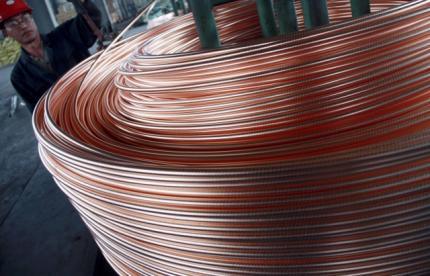Copper near 2-mth peak; nickel sinks in volatile trade
Bareksa • 20 May 2014

An employee unloads copper at a factory in Nantong, Jiangsu province (REUTERS/China Daily)
The most-traded August copper contract on the Shanghai Futures Exchange climbed 0.3 percent
Bareksa.com - Copper clung near two-month peaks on Tuesday on hopes a new raft of financial reforms would shore up China's slowing economy, while nickel prices sank in volatile trade despite supply concerns.
Adding to supportive measures, China's State Administration of Foreign Exchange said on Monday it will reform the management of cross-border foreign exchange guarantees.
Efforts by China to quicken the pace of reforms to support growth in the world's second-biggest economy have helped to improve sentiment towards copper, said Jonathan Barratt, chief executive of commodity research firm Barratt's Bulletin in Sydney.
"The sentiment is certainly there, but the numbers coming out of Asia aren't that good; neither are the numbers from the States," he said.
The price of bellwether iron ore, which tends to run ahead of copper prices, was also boding ill for copper demand, he said.
"If [China's] consumption of iron ore and steel don't pick up, then the rally in copper might just be limited."
Three month copper on the London Metal Exchange (LME) was little changed at $6,919 a tonne by 0227 GMT, following a 1 percent gain in the session before when prices hit the highest since March 7 at $6,954 a tonne.
The most-traded August copper contract on the Shanghai Futures Exchange climbed 0.3 percent to 48,750 yuan ($7,800) a tonne.
Spot iron ore prices fell to a 2-1/2 year low on Monday while China and Singapore futures hit record lows, under pressure from rising supply and weaker Chinese steel markets.
In other metals, LME nickel erased early 2 percent gains to fall 2 percent to $19,705 a tonne, eroding Monday's 5.5-percent advance, and falling further from a 27-month peak of $21,625 on May 13.
Investors are yet to be convinced of the value of commodity investments at this stage in the economic cycle. Total global commodity assets under management fell to $322 billion in April 2014 from $324 billion in March 2014, Barclays Capital said on Monday.
The Federal Reserve's super-easy policies, if pursued for too long, could have adverse consequences in the long run, two top Fed officials said on Monday, although the biggest risk is not runaway inflation.
In news, global demand for primary aluminium is set to rise 7 percent in 2014 on the back of solid growth in China, a senior executive with Alcoa Inc AA.N said on Tuesday. (Source : Reuters)